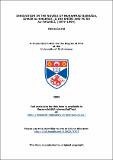Innovation in the novels of Muḥammad Barrāda, Idwār al-Kharrāṭ, Ilyās Khūrī and Fu'ād al-Takarlī, (1979-1999)
Abstract
This thesis is a detailed literary analysis of the innovative elements in the novels of four of the most significant contemporary Arab authors: the Moroccan Muhammad Barrāda, the Egyptian Idwār al-Kharrāṭ, the Lebanese Ilyās Khūrī and the Iraqi Fu'ād al-Takarlī.
These novels were published between 1979 and 1999, a period during which the work of these authors reached literary maturity. While this thesis (unlike many critical studies of Arabic fiction written in English) is based on close textual analysis of the texts in question, it
places its findings within a wider framework: its introduction (the first part of an essay on literary innovation) defines what is meant by innovation in the Arabic novel; its conclusion (the second part of that essay), is an attempt to connect the innovative methods adopted by the above mentioned writers with the wider literary scene: it shows how these writers have contributed to promoting some of the main innovative trends of the Arabic novel in the last few decades. In adopting a literary approach to these novels, we have considered how the writers' formal choices and techniques have shaped the content of their texts. In this way, we have not only highlighted the importance which the novelists' socio-political discourse assumes in Arab societies, but have also underlined how this discourse is more or less successful because of its artistic merits. The first chapter of this thesis deals with the highly fragmented nature of these texts (lack of ordered development or plot); the second chapter tackles the problems inherent in narrative voice and the position of the authors within their texts; the third chapter explores the intertextual connections these writers use to shape a certain discourse; the fourth chapter deals with the way these novelists promote a self-referential kind of fiction.
Type
Thesis, PhD Doctor of Philosophy
Collections
Items in the St Andrews Research Repository are protected by copyright, with all rights reserved, unless otherwise indicated.

